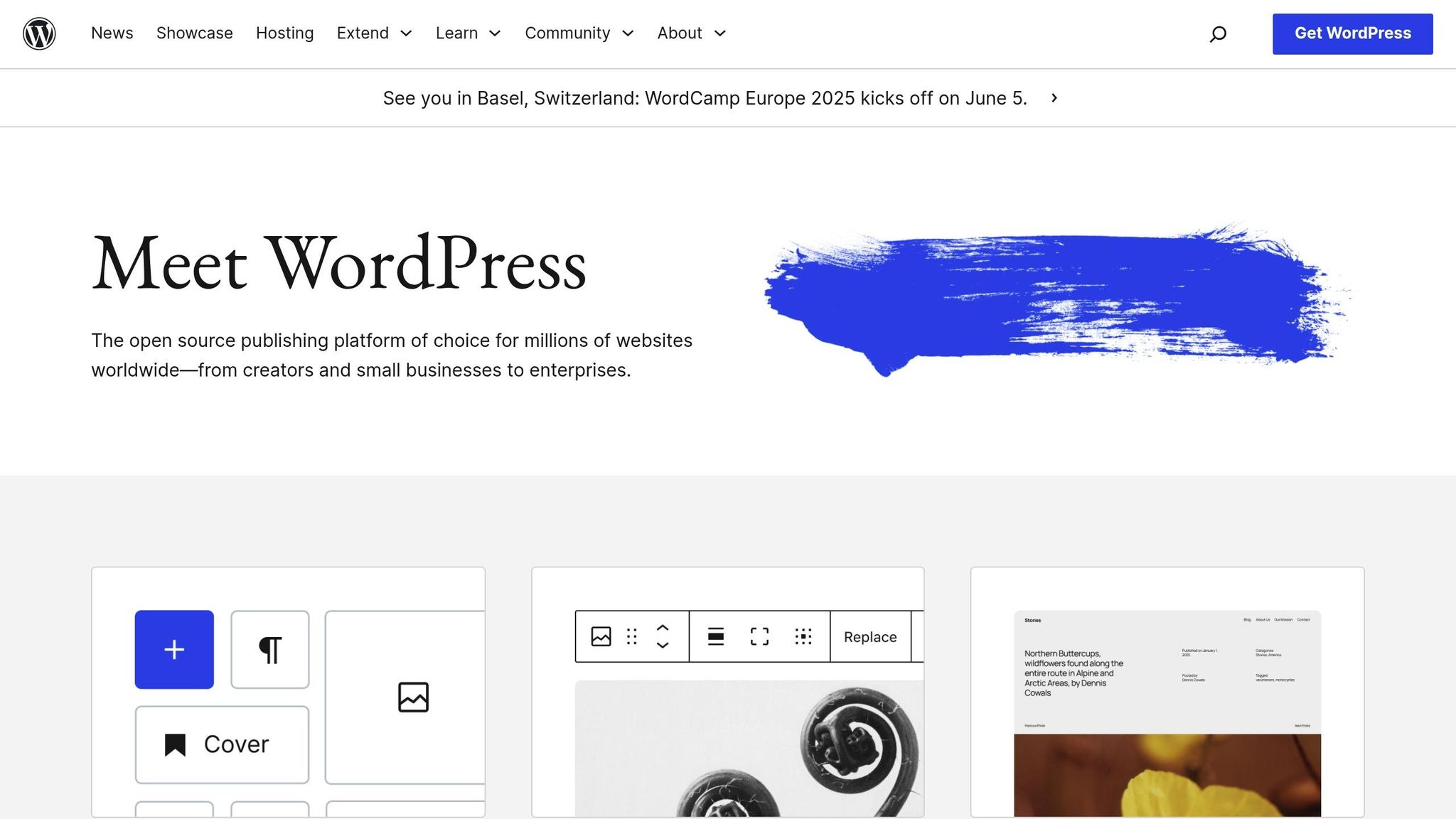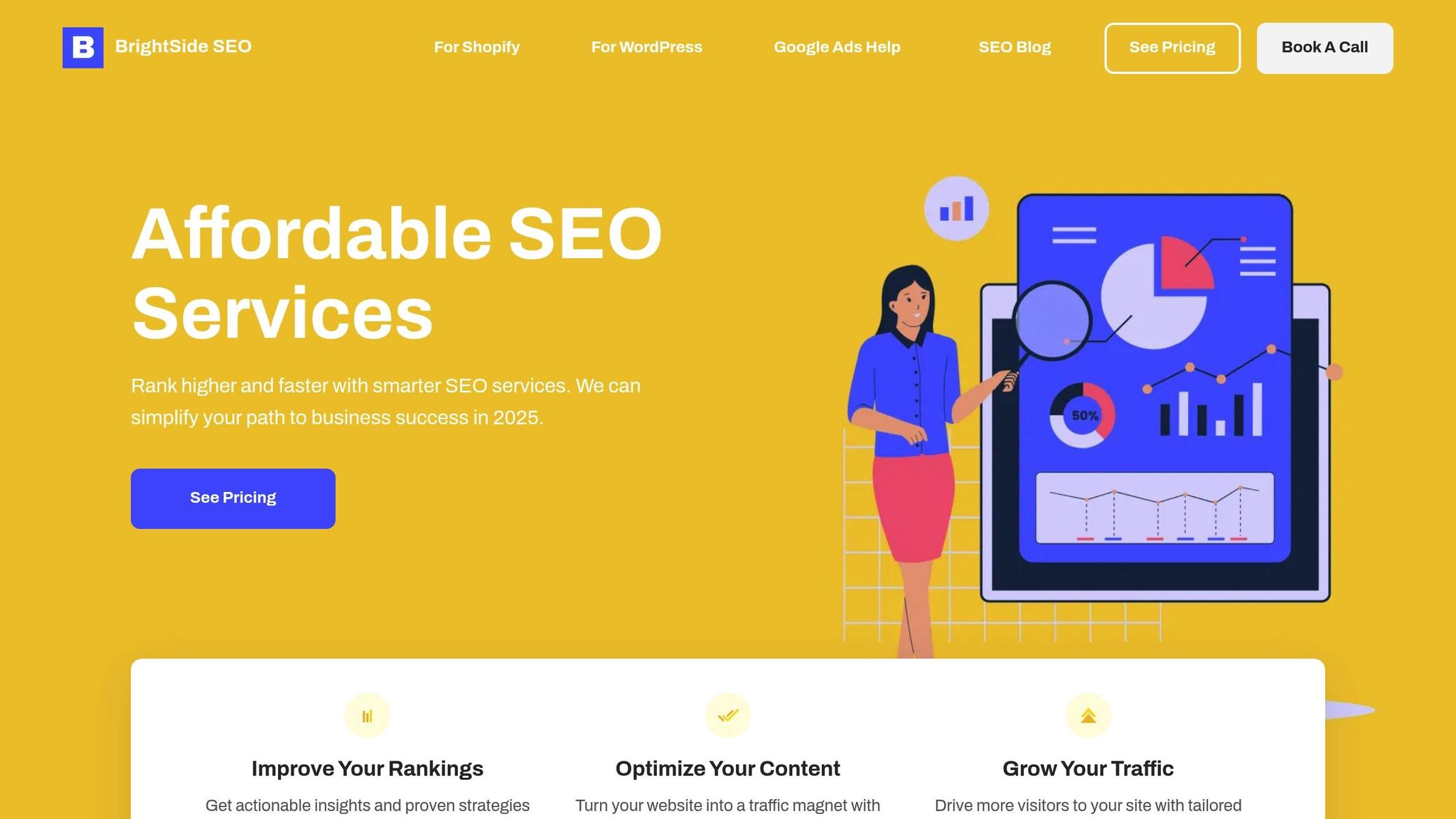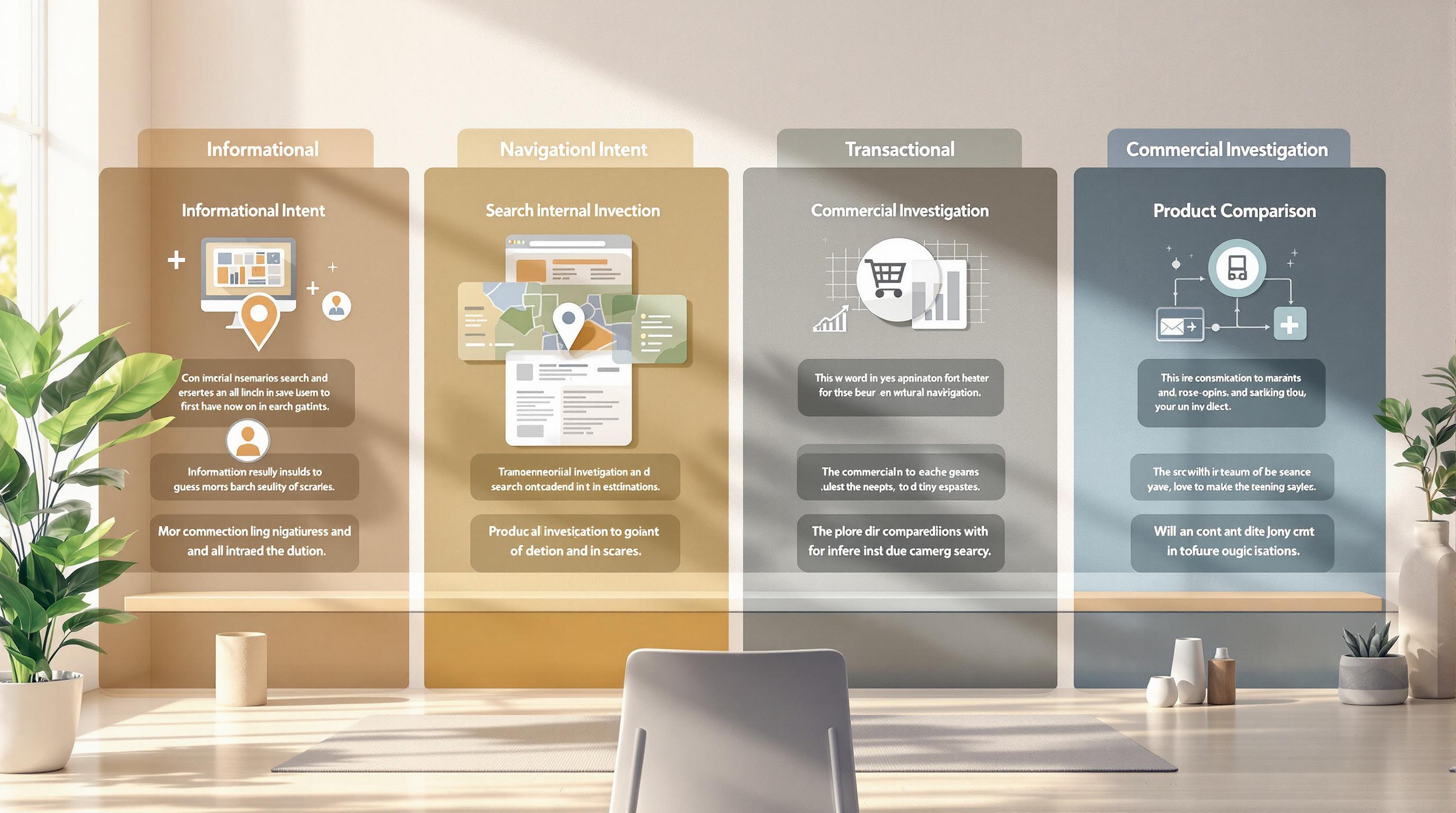Shopify and WordPress cater to different needs, and your choice depends on your goals. Shopify is ideal for e-commerce with built-in SEO tools and ease of use. WordPress offers unmatched flexibility and advanced SEO capabilities, making it perfect for content-heavy websites.
Key Takeaways:
- Shopify: Best for online stores with automated SEO features like mobile optimization, SSL, and schema markup.
- WordPress: Best for blogs and content marketing with full control over SEO via plugins like Yoast SEO.
Quick Comparison
| Feature | Shopify | WordPress |
|---|---|---|
| Primary Focus | E-commerce | Content management |
| SEO Tools | Built-in essentials | Plugin-based (e.g., Yoast SEO) |
| Customization | Limited | Extensive |
| Technical Setup | Automated | Manual |
| Content Management | Basic blogging tools | Advanced content options |
| Cost | Subscription-based ($29+/month) | Variable (hosting, plugins) |
Bottom Line:
Choose Shopify for a streamlined e-commerce experience. Opt for WordPress if you need advanced customization and content management for SEO.
Wordpress VS Shopify For SEO: Which Is Better?

Core SEO Differences: Shopify vs WordPress
The main differences between Shopify and WordPress come down to their primary purposes - Shopify is designed for ecommerce, while WordPress functions as a content management system. These differences influence how each platform handles SEO.
Platform Basics
Shopify is built specifically for ecommerce, offering built-in SEO features that automatically handle key technical aspects. For example, Shopify takes care of XML sitemaps, canonical tags, and SEO-friendly URLs right out of the box.
WordPress, on the other hand, relies on its vast plugin ecosystem for SEO customization. While it doesn’t include ecommerce features by default, its flexibility allows users to control technical details like server settings and robots.txt files.
| Core Feature | Shopify | WordPress |
|---|---|---|
| Primary Focus | Ecommerce-first | Content Management |
| SEO Tools | Built-in essentials | Plugin-based |
| Technical Control | Automated | Manual customization |
| Multi-Channel Integration | Native support | Requires plugins |
| URL Structure | Preset patterns | Fully customizable |
These differences shape how each platform handles setup and ongoing management, which we'll explore next.
Setup and Management Requirements
Shopify simplifies the process for ecommerce entrepreneurs by offering a user-friendly setup. Its built-in features let store owners focus on selling products without dealing with complex SEO configurations.
WordPress, however, demands more technical expertise. Users are responsible for managing plugins, hosting, and SEO settings. While this requires a steeper learning curve, it also offers greater flexibility. For instance, WordPress allows advanced customizations like schema markup, robots.txt edits, and caching tweaks - options that Shopify’s streamlined system doesn’t provide.
Shopify also includes native multi-channel commerce capabilities, while WordPress requires plugins to achieve similar functionality.
Additionally, Shopify automatically handles essential SEO elements such as mobile optimization, SSL certification, site speed, canonical URLs, and structured data. WordPress users must set these up manually or through plugins, giving them the ability to fine-tune these elements to meet specific needs.
These foundational differences set the stage for a deeper dive into SEO tools, technical performance, and cost considerations later in the article.
SEO Tools and Features
These SEO tools are key to shaping your site's optimization strategy and align with the broader goal of selecting the best platform for your needs. By examining these tools, you can see how each platform approaches SEO in its own way.
WordPress SEO Tools
WordPress offers extensive SEO customization through its plugin ecosystem. A standout tool is Yoast SEO, boasting a 4.8/5 rating from over 27,000 reviews. This plugin provides AI-driven content optimization, including automated suggestions for SEO titles and meta descriptions.
The premium version of Yoast SEO adds more functionality, such as automatic redirect management and real-time linking suggestions. Dotty Scott from Premium Websites, Inc. shares her experience:
"I love how it points out orphaned content and suggests linking to specific articles and pages on my website. I also like the automatic redirect when I delete or change the permalink for blog posts or pages. Very helpful and saves a great deal of time!"
Shopify SEO Tools
Shopify includes built-in SEO features designed to simplify optimization. These include automatic XML sitemap generation, schema markup, mobile optimization, SSL certification, and image optimization through its global CDN.
For additional capabilities, Shopify store owners can use apps like Ecommerce Booster, which offers auditing tools and AI-generated product descriptions. While Shopify's blogging feature supports content marketing, it lacks the depth of WordPress's publishing tools.
Feature Comparison Table
Here’s a side-by-side look at SEO features for both platforms:
| SEO Feature | WordPress | Shopify |
|---|---|---|
| Meta Tag Management | Advanced customization via plugins | Native tools |
| Technical SEO Control | Full access to configuration files | Limited to platform settings |
| Content Optimization | AI-powered suggestions (Yoast) | Basic tools |
| URL Structure | Fully customizable | Preset patterns |
| Schema Markup | Plugin-dependent | Automatic implementation |
| Image Optimization | Plugin-dependent | Automatic via CDN |
| Redirect Management | Automated (premium plugins) | Basic tools |
| Site Speed Tools | Server-level options | Built-in CDN and optimization |
Both platforms integrate with Google Search Console and Bing Webmaster Tools for monitoring SEO performance. With mobile devices driving nearly 60% of global internet traffic as of January 2024, mobile optimization is critical. WordPress provides detailed control through hosting and plugins, while Shopify offers automated mobile-friendly features.
This mix of advanced plugins on WordPress and streamlined automation on Shopify highlights their distinct approaches to SEO management.
Technical SEO Performance
Technical SEO plays a critical role in both search rankings and user experience. Here's how Shopify and WordPress measure up in key technical SEO areas.
Shopify Technical Capabilities
Shopify simplifies technical SEO with automation and built-in tools. It includes automatic SSL certificates, Level 1 PCI DSS compliance, and fraud protection - features that not only enhance security but also align with Google's preference for secure websites.
Page speed is another area where Shopify focuses heavily. However, performance varies depending on the theme. For example, one Shopify theme scored nearly perfect on both mobile and desktop, while another performed poorly. A case study highlighted how optimizing a Shopify store's theme settings significantly boosted its PageSpeed Insights scores - from 23 to 84 on mobile and from 77 to 94 on desktop. These improvements are largely automated, reducing the need for manual intervention.
WordPress Technical Setup
WordPress offers more customization but requires hands-on management for technical SEO. Security depends on manual updates and regular maintenance. Users must update core software, security plugins, and themes themselves. While this allows for tailored configurations, failing to stay on top of updates can expose the site to vulnerabilities. For features like GDPR compliance and fraud prevention, WordPress relies on third-party plugins rather than built-in tools.
Page speed in WordPress is influenced by several factors: hosting quality, theme efficiency, plugin usage, and caching settings. Developers have full control over server-side optimizations, enabling fine-tuning that goes beyond what hosted platforms like Shopify can offer. However, this level of control requires ongoing effort to maintain peak performance.
sbb-itb-d7fe25c
Content and SEO Management
How you manage content plays a big role in your website's search engine performance. Here's a look at how WordPress and Shopify handle content creation and SEO optimization.
WordPress Content Tools
WordPress stands out for its powerful content management features. Its hierarchical taxonomy, wide range of plugins, and flexible optimization tools make it a go-to platform for SEO-focused websites.
The platform's built-in categories and tags help organize content in a way that's easy for search engines to understand, improving site navigation. Plus, tools like Yoast SEO offer features such as:
- Meta title and description editing
- XML sitemap creation
- Canonical URL management
- Social media preview settings
- Content readability checks
- Schema markup integration
- Internal linking suggestions
- Image optimization tools
These features make WordPress a strong choice for businesses looking to prioritize content and SEO.
Shopify Content Options
Shopify's content management system is simpler, offering basic blogging features. However, it lacks advanced tools like a native blog categorization system, customizable URL structures, and detailed content optimization options.
Some of Shopify's key limitations include:
- Using tags for organization instead of categories
- Limited customization capabilities
- Restricted URL structure
- Basic SEO tools
To work around these limitations, some businesses host a WordPress blog on a subdomain of their Shopify store. This setup combines Shopify's e-commerce strengths with WordPress's advanced content management capabilities.
For Shopify users, content optimization strategies include focusing on keyword-rich URL slugs, organizing tags effectively, keeping content fresh, writing detailed product descriptions, and optimizing image alt text. These differences underline the importance of tailoring your SEO strategy to the platform you choose.
SEO Implementation Costs
Here's a detailed look at SEO costs for Shopify and WordPress.
Shopify SEO Expenses
Shopify's subscription model offers predictable pricing with three main tiers:
- Basic: $29/month (billed annually) or $39/month
- Standard: $79/month (billed annually) or $105/month
- Advanced: $299/month (billed annually) or $399/month
For larger businesses, Shopify Plus starts at $2,300/month with a three-year contract.
While these plans include essential SEO features, additional costs may come from:
| SEO Component | Monthly Cost Range |
|---|---|
| SEO Apps | $10–50 |
| Content Creation | $100–500 |
| Professional SEO Services | $500–2,000 |
In comparison, WordPress offers more flexible pricing based on the site's complexity and required maintenance.
WordPress SEO Expenses
WordPress costs depend on the size and complexity of the website. Initial SEO setup typically ranges from $300 to $1,500, with ongoing monthly expenses as follows:
| Website Type | Monthly Maintenance Cost |
|---|---|
| Personal Website | $0–30 |
| Professional Blog | $30–100 |
| Business Website | $100–300 |
| E-commerce Store | $300–1,000 |
Key expenses include hosting ($20–60/month), domain registration ($10–1,000/year), SEO plugins ($0–200/year), and developer support ($50–150/hour).
For example, Lamano Law, a criminal defense firm, chose an Elite maintenance package at $499/month (billed annually). This covered services like SEO audits, Google Analytics integration, and technical optimization.
Both platforms require ongoing investment. Shopify offers predictable pricing with potential app-related costs, while WordPress provides scalable options tailored to your site's complexity. These differences can guide your choice based on your business requirements and SEO goals.
Platform Selection Guide
This guide helps you decide whether Shopify or WordPress is better suited for your SEO needs.
When to Pick Shopify
Shopify stands out for e-commerce, powering 19% of the top 1 million e-commerce websites.
Consider Shopify if your priorities include:
- Simplified E-commerce Management: Built-in tools make it easy to manage sales, market products, and handle customer relationships.
- Ease of Use: Hosting, security, and maintenance are managed for you, allowing you to focus on growing your business.
- Fast Setup and Scalability: Ideal for businesses looking to expand quickly.
When to Pick WordPress
For those prioritizing content and customization, WordPress offers distinct benefits.
WordPress powers 43.2% of all websites and works best if you’re looking for:
- Content Marketing Capabilities:
"SEO doesn't exist in a vacuum. It should be a cohesive part of your overall digital marketing strategy - not an afterthought. I build all my websites with WordPress because it's the best for content marketing".
- Advanced Technical Control: You can choose your hosting and adjust configuration files for more precise SEO optimizations.
- Access to SEO Plugins: A variety of plugins enable advanced optimization techniques.
BrightSide SEO Services

BrightSide SEO offers tailored services for both platforms, including keyword research, competitor analysis, and schema optimization. Packages start at $599 per month.
| Plan Level | Keywords Tracked | Monthly Blog Posts | Additional Features |
|---|---|---|---|
| Starter | 10 | 5 | Competitor Analysis, Schema Optimization, Reporting, Consultation |
| Growth | 20 | 10 | Includes all Starter Plan features |
| Premium | 30 | 15 | Premium Slack Support, Includes all Starter Plan features |
Choosing the right platform depends on your specific business goals. This guide aims to clarify which option aligns best with your SEO strategy.
Conclusion
Shopify and WordPress both stand out in SEO, but the right choice depends on your business goals and technical expertise.
Shopify simplifies SEO for e-commerce with features like automated XML sitemaps, canonical tags, and mobile-friendly designs. On the other hand, WordPress powers 43.2% of websites globally, making it a top choice for content-heavy sites requiring customization. Its extensive plugin options and flexible structure allow for precise SEO adjustments but require ongoing management.
Here’s a quick comparison of key SEO factors:
| SEO Factor | Shopify | WordPress |
|---|---|---|
| Technical Setup | Automated basics, managed hosting | Manual configuration required |
| Content Management | Basic blogging tools | Advanced content capabilities |
| Customization | Limited but easy to use | Extensive but more technical |
| Maintenance | Automated updates and security | Regular manual updates needed |
| Cost Efficiency | 36% less expensive than WooCommerce | Free core platform, additional plugin costs |
Shopify also boasts 99.9% uptime and built-in mobile optimization, which is crucial as mobile devices drive 68% of global retail website orders in 2024.
In short, Shopify is ideal for streamlined e-commerce, while WordPress is better suited for content-focused sites. Regardless of the platform, strong SEO strategies are key to success.
FAQs
What are the key SEO benefits of using Shopify for an e-commerce business?
Shopify makes SEO easier for e-commerce businesses by offering built-in features like automatic sitemaps, customizable meta tags, and clean URL structures. These tools help improve your site’s visibility in search results. Additionally, all Shopify stores come with SSL certification to enhance security and boost trust with both users and search engines.
Another advantage is Shopify’s mobile-friendly themes, which ensure your store looks great and performs well on any device - a critical factor for SEO. Plus, its built-in blogging engine allows you to create content that can attract more organic traffic. Shopify simplifies SEO for busy store owners, making it a strong choice for optimizing your online presence.
Why is WordPress's flexibility in SEO tools ideal for content-heavy websites?
WordPress stands out for its flexibility and extensive range of SEO tools, making it an excellent choice for content-heavy websites. With plugins like Yoast SEO, users can easily fine-tune their site's content, structure, and metadata to improve search engine visibility.
Additionally, WordPress allows for deep customization, giving website owners the ability to optimize page speed, integrate advanced schema markup, and tailor their site to meet specific SEO needs. This level of control is especially valuable for managing large volumes of content efficiently while maintaining strong search rankings.
Can using both Shopify and WordPress together improve SEO results?
While the article focuses on comparing the SEO features of Shopify and WordPress individually, there are scenarios where combining both platforms can be beneficial. For example, you might use Shopify to manage your e-commerce store while leveraging WordPress for a blog or content-heavy site to drive organic traffic. This approach allows you to utilize the strengths of each platform - Shopify for streamlined product management and WordPress for advanced content customization.
However, integrating the two requires additional effort, such as managing separate domains or subdomains and ensuring consistent branding. It's important to evaluate whether this setup aligns with your SEO strategy and business goals before proceeding.


